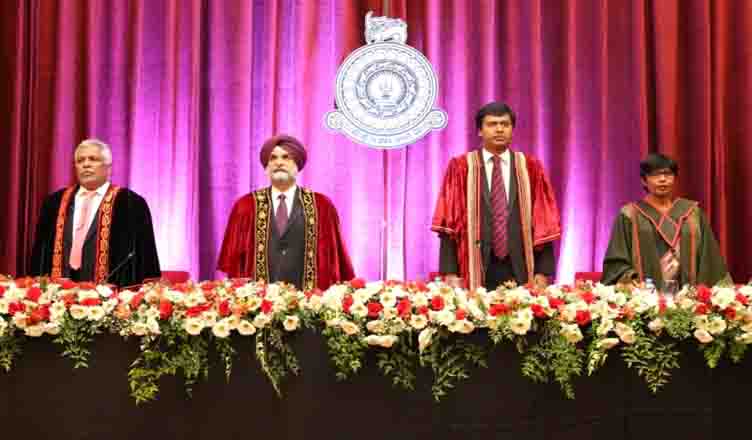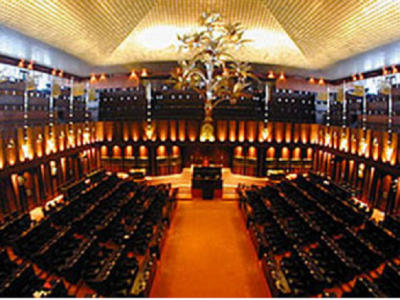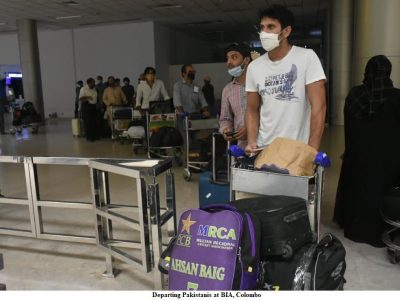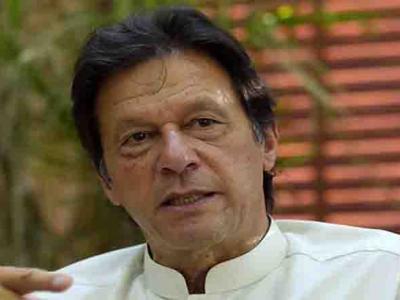(COLOMBO, LANKAPUVATH) – High Commissioner of India H.E. Taranjit Singh Sandhu delivered the prestigious 14th Sujata Jayawardena Memorial Oration on 3 April at the BMICH before a packed audience. The topic of the address was: ‘Sabka Sath Sabka Vikas: Together We Progress’- India-Sri Lanka Relations in the light of India’s Neighbourhood First Policy’.
High Commissioner was escorted in a Ceremonial Procession to the Hall. Many dignitaries including Vice Chancellor, University of Colombo Senior Professor Lakshman Dissanayake, President of Alumni Association Mr. Rajeev Amarasuriya and Senior Prof. Nayani Melagoda, former High Commissioner of Sri Lanka to India Prof. Sudharshan Seneviratne and Deshamanaya Tissa Devendra graced the occasion. The oration is an annual event organised by the Alumni Association of University of Colombo. The Alumni Association of University of Colombo presented High Commissioner with the Sujata Jayawardena Memorial Plaque.
High Commissioner, in his address, emphasized that Sabka sath Sabka vikas (Together we progress) sums up in one line the very essence of our Neighbourhood first policy. He reiterated the importance India attaches to progressing together with Sri Lanka, as self-interest alone is neither in our culture nor in our behaviour. He added that neighbourhood is crucial not just because we share physical borders. Neighbourhood is significant because we are joined by blood. India & Sri Lanka are not just near to each other; they are close to each other. He spoke about the recent achievements of both India & Sri Lanka in recent years, and how they have evolved over time.
High Commissioner noted that as responsible democracies, like Sri Lanka, India also does not believe in sacrificing civil liberties for achieving development. He spoke about the three ‘B’s, which signify India-Sri Lanka relations: Broad, Blend and Buddha. He emphasized that India has never believed in setting conditionalities for friendship. India’s heart is broad and big. India does not see friendships through transactional lens. He added that India has always believed in sharing what it has. Even while struggling to meet its own developmental priorities, India has shared the fruits of our expertise, knowledge and skill set with our friends and partners. He pointed out that India’s aid is not to raid or invade. Indian assistance is based on Sri Lanka’s own requirements. India’s partnership blends with Sri Lanka’s priorities. He noted that Buddhism first came to Sri Lanka from India before it spread anywhere in the world. This was not just because of proximity. It was because of the interconnectedness India & Sri Lanka felt for each other, even in those times. He added that Ashoka sent his own worthy children, Mahinda and Sanghamitta to Sri Lanka to spread Buddhism while sending emissaries to other parts of the globe. Sri Lanka was special for India not just now, but even then. He noted that India is proud of its Buddhist identity.
High Commissioner noted how leaders in both countries have imparted a new energy to India-Sri Lanka ties. He cited that greater connectivity and economic integration are our promise for a better tomorrow. He pointed out the various opportunities which Sri Lanka has, given its proximity to India, to meet its developmental aspirations. He clarified that India does not covet Sri Lanka’s markets, assets or land. He reiterated that India wants to walk with Sri Lanka at a pace Sri Lanka is comfortable with. India seeks a secure and prosperous future for Indian Ocean region that lives up to the name of SAGAR- Security and Growth for All in the Region.
High Commissioner noted that India believes that success of one must propel the growth of many. He specified that the real ownership of India-Sri Lanka relations rests with the people in both the countries. The people have to decide whether to look at the past, survive in the present or work towards a common future. He reassured that India will be there for Sri Lanka whenever Sri Lanka needs India.




